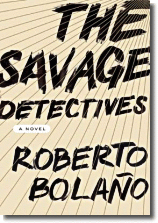 Joanne Harris
Joanne Harris is the author of the Whitbread-shortlisted
Chocolat (made into a major film starring Juliette Binoche),
Blackberry Wine, Five Quarters of the Orange, Coastliners, Holy Fools, Jigs & Reels, Sleep Pale Sister, Gentlemen & Players and, with Fran Warde, The French Kitchen: A Cookbook and The French Market: More Recipes from a French Kitchen. Her first children's novel,
Runemarks -- it features Maddy, a kickass heroine with magical rune powers -- is coming soon to America.
Harris named a top 10 list of "kids' books with kickass heroines" for the
Guardian.
Number One on the list:
The Ruby in the Smoke by Philip Pullman
 This novel is splendidly written in the tradition of the Victorian melodrama, but Sally Lockhart is no simpering miss. Raised by her father, she can shoot, fight and speak Hindustani, and has none of the accomplishments thought necessary to a young lady of her time. Left in the care of a relative following her father's death, and threatened with the horrid possibility of having to become a paid companion, she runs away, but is haunted by dreams and strange messages that point her to the mystery in her own past.
This novel is splendidly written in the tradition of the Victorian melodrama, but Sally Lockhart is no simpering miss. Raised by her father, she can shoot, fight and speak Hindustani, and has none of the accomplishments thought necessary to a young lady of her time. Left in the care of a relative following her father's death, and threatened with the horrid possibility of having to become a paid companion, she runs away, but is haunted by dreams and strange messages that point her to the mystery in her own past.
Read
the entire list.
--Marshal Zeringue



















